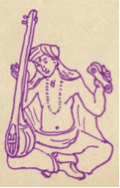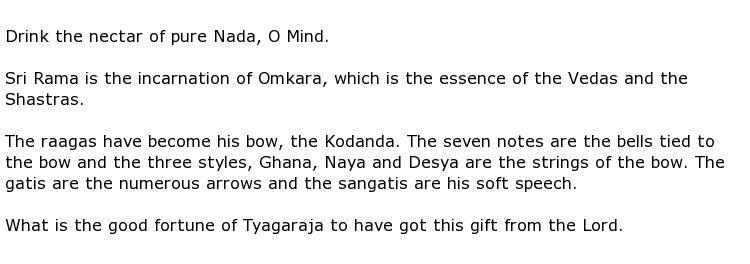 The Indian poet and classical music composer Tyagaraja is famous for many compositions. One of his most popular was Pancharatna Kritis, which is translated into English as Five Gems. These pieces of music are still heard today, accompanied with words that are sung in his honour. He has been known by a number of names including Kakarla Tyagabrahmam, Saint Tyagaraja, Tyagayya in Telugu or Tyagarajar in Tamil. The words that he composed were lucid and poetic, and written in the Sanskrit language.
The Indian poet and classical music composer Tyagaraja is famous for many compositions. One of his most popular was Pancharatna Kritis, which is translated into English as Five Gems. These pieces of music are still heard today, accompanied with words that are sung in his honour. He has been known by a number of names including Kakarla Tyagabrahmam, Saint Tyagaraja, Tyagayya in Telugu or Tyagarajar in Tamil. The words that he composed were lucid and poetic, and written in the Sanskrit language.
It is believed that Tyagaraja was born on the 4th May 1767 in a place called Thiruvaiyaaru which lies in the Thanjavur District. His family were Hindus belonging to the Smarta tradition of worship, a Puranic religion which centres on five shrines and five deities, all of equal status. He was the youngest of three brothers and he may have been inspired to take up music and poetry by his paternal grandfather who was also a poet and musician.
Tyagaraja grew up with a desire to experience the love of God and he used this devotion in his musical training, which began at an early age. The technicalities of musical composition were second to his strong faith but it was clear, from the beginning, that he had the touch of a genius about him. His talent came to the notice of the king and he was invited to court to perform and write for him. Tyagaraja turned down this invitation as he wanted to concentrate on his devotional work dedicated to Rama, rather than be a court entertainer.
In common with many holy men at that time, he chose to live a spartan life with no thought at all for his own comforts. Unfortunately this meant that he was unable to write down much of his work for future generations to enjoy. Sometimes he would sit in front of a deity manifestation of Lord Rama, with his disciples also seated around him, singing his songs to them. They tried to note down some of the words and notes but these notes were taken on palm leaves. It followed, then, that preservation of the great man’s work was a challenging business, although, remarkably, these palm leaves were kept and passed on to their descendants. It seems that there was no published record of his words and music in the traditional sense although musical historians made concerted efforts to trace this fragile but precious material and some were published eventually.
The songs of Tyagaraja received widespread popularity and some have claimed that he was responsible for some 24,000 songs. This figure has been disputed for lack of evidence though. Around 700 songs are still in existence and are still popular in modern times. As well as songs, he wrote musical operas and spoken plays but the majority of work seems to be centred on simple pieces that are appropriate for choral singing. Here is an example of his work, a translation into English of a short poem called Nadasudharasa:

Scholars of Hindu music and poetry have often said that Tyagaraja produced work that often looked back and told a historical story while, at the same time, he had the vision to look forward and predict how the future might look. Musical and literature festivals are regularly held in his honour with Carnatic musicians from all over the world converging on the site of his burial to celebrate his words and music.
Tyagaraja died on the 6th January at the age of 79.

